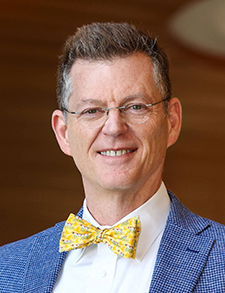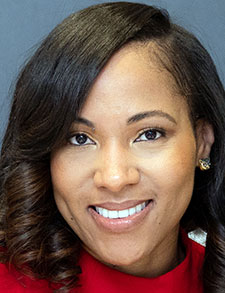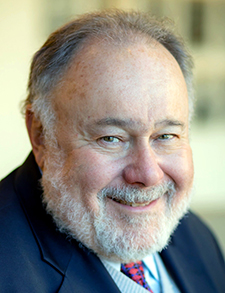
Dr. Howell
Early in his career, Eric Howell, MD, MHM—now the chief executive officer of the Society of Hospital Medicine—was a “prototypical hospitalist,” as he put it. He was young, and he was part of a growing, but still relatively small, medical division.
And when it came to certain parts of the job, he was, like so many of his peers, a bit in the dark.
“We’d been trained as physicians, not as leaders and businesspeople,” said Dr. Howell, who was then a hospitalist at Johns Hopkins. “So we were often in the middle of those financial discussions—or, frankly, tense negotiations with other physicians or hospital leaders—and none of that was taught in medical school.”
In 2004, SHM—which was helping hospitalists prepare for all the new field’s demands, and until a year earlier had been the National Association of Inpatient Physicians—responded to a pent-up hunger for leadership training with a new, one-day pre-course held in New Orleans. Developed by co-directors Russell Holman, MD, MHM, and Mark Williams, MD, MHM, the course received rave reviews from the 100 attendees, but was sold out and left many on a waiting list.
So SHM went bigger, with a four-day academy first held in Tucson in 2005. And this year, the SHM Leadership Academy is celebrating its 20th anniversary—demonstrating a longevity that doesn’t seem surprising to those who experienced its impact first-hand in its early years.
Dr. Howell, who was among the academy’s first faculty members, said the academy has had widespread effects.
“My personal belief, and one of the reasons why I was so happy to do this more than 20 years ago, is that I think we need more physician leaders in medicine,” he said. “And I think that it’s probably not the sole reason, but one of the reasons, that there are so many hospital medicine leaders across the country.”
The academy began with just one track, the more introductory track now known as Strategic Essentials. But after about five years, more advanced tracks—Influential Management and Mastering Teamwork—were added. And a few years after that, the Leadership Capstone course, which includes an ongoing, six-month component, was introduced in response to attendees who wanted a longer training experience to keep their skills sharp.
The academy’s faculty members and course directors, while still focusing on teamwork, conflict resolution, finances, and other core concepts, are constantly assessing their content so that the details keep up with the times, in response to the realities of healthcare and to the feedback given by participants.
The academy—in which instructors balance bursts of lecture with hands-on discussions that put the lessons into practice—has sparked such enthusiasm and dedication from participants that it can be hard to imagine that it wasn’t always a part of SHM’s offerings. Attendees say it proved to be an indispensable part of their training and a vital piece in their career trajectory.

Dr. Kennedy
Kierstin Kennedy, MD, MSHA, SFHM, chief medical and quality officer at the University of Alabama at Birmingham Hospital in Birmingham Ala., and the course director for the academy for the last several years, said she had just finished a fellowship in quality improvement in 2014 and was starting a post as director of quality improvement. Still, she said, she didn’t quite feel ready.
“Despite having finished this fellowship—and also, by the way, having a master’s in health administration, which I had finished in 2011—I didn’t totally feel ready to be leading people, and I felt like I needed some more practical training,” she said. “Not that there wasn’t leadership training in those other programs—there absolutely was. But now it was sort of like, how do you take this very academic approach to leadership and implement it?”
So she looked for leadership training that would be applicable immediately and came across SHM’s Leadership Academy. It raised her eyebrows, and that year’s location in 2014 wasn’t exactly a deterrent, she said.
“It did not hurt that it was in Hawaii,” she said.
She attended the Influential Management level—because of her health administration degree, she opted out of the introductory Strategic Essentials level—and the effects were profound, she said.
“It was just a really transformational experience, I thoroughly enjoyed it,” she said. “I had not had any training like that. The topics that we talked about — none of these were things that had been covered in my fellowship or in my master’s program.” She remembers discussions about being self-aware during tense moments—are you in the basement or on the balcony, with a wider vantage point—and conversations about feeling sandwiched between those who report to you and bosses to whom you report.
“I remember sitting in there thinking, ‘Oh my god, this is my life—this is every day, I feel sandwiched.’”
She could, she felt, put the lessons to work back at home right away.
“It felt like, just add water and stir,” Dr. Kennedy said. “It did immediately relate to going back to work and managing people, and managing up, and advocating for my area.” Upon returning, she said, she and her colleagues developed a mission and vision for their department.
The next year, she attended the academy in Austin, enrolling in the Mastering Teamwork course. At dinner, she recalled, she discussed that day’s lessons with her colleagues, some of whom were enrolled in different courses.
But after that, she said, there was a letdown: There were no more courses for her to take; she had aged out.
Then she learned that the Strategic Essentials course, which she had not taken, included facilitators who sat at participants’ tables to answer questions and propel discussions.
At the annual meeting in Las Vegas, she “legally stalked” Dr. Howell, then the course director, and told him she would like to be one of those facilitators. He said she should forward her information. From a session room, she emailed him her CV, and she was a facilitator the following year.
For 10 years now, after Dr. Kennedy’s suggestion, the University of Alabama has earmarked money to send its hospitalist leaders to the academy.
“That’s an expectation of the role that you have to have leadership training, and that’s how we invest in our leaders,” Dr. Kennedy said.
As course director and an instructor in the course, she and the rest of the faculty work hard to respond to the evolving needs of attendees, she said.
“We’ve kept the things that are really relevant and that resonate and that don’t need to go anywhere,” she said. “But we take those evaluations really seriously. I mean, we obsess over those comments and the rankings, and we pay attention to themes.”

Dr. Marcus
Leonard Marcus, PhD, co-director of the National Preparedness Leadership Initiative at Harvard University, made changes to his Influential Management course teachings after the COVID-19 pandemic.
“COVID-19 was a game-changer for hospitalist leadership,” he said. “It turned every leader into a crisis leader. It was a stark reminder that hospitalists must be prepared and ready to guide their followers through whatever crisis confronts them. The seminar pivoted to provide content, examples, and applications of meta-leadership applicable to times of crisis.”
He said the details of what needs to be emphasized in the coursework gradually shift over time.
“When I began teaching at SHM, hospitalists had to be advocates for their colleagues, their recognition, and their budget within the hospital,” he said. “This relatively new function was still fighting for acceptance across the healthcare system. It is, of course, different now. Now the fights are for adequate salaries, a reasonable workload, and the resources to do the job as it is meant to be.”
Dr. Marcus said he enjoys teaching in the academy’s environment.
“The Leadership Academy brings together really good people who are looking at how to expand their work and mission in health care,” he said. “I have the opportunity to speak and teach in many leadership programs around the world. The Leadership Academy is among my favorite venues.”
Dr. Kennedy said the changes are noticeable in hospitalists after they’ve attended.
“I can definitely tell the difference between a leader that’s been to Leadership Academy and one that hasn’t yet,” she said, “both in the way that they organize projects, the way that they think about engaging stakeholders, the way that they approach conversations—honestly, we see a little bit of the maturity in how they approach problems.”
Dr. Howell said that, for many hospitalists, the academy has been the first step toward leadership roles.
While acknowledging that “it doesn’t get all the credit,” he said that “many of them began their careers as front-line hospitalists, clinical hospitalists, and then built their skills and leadership in part because of the leadership academy. I think our academy has helped many young leaders in hospital medicine get their first step, and sometimes their first few steps, into their leadership and give them the skill sets to be successful as leaders outside of just the bedside.”
Tom Collins is a medical writer based in South Florida.
Leadership Academy co-founder, Dr. Rusty Holman, writes about the origins and legacy of SHM’s Leadership Academy.